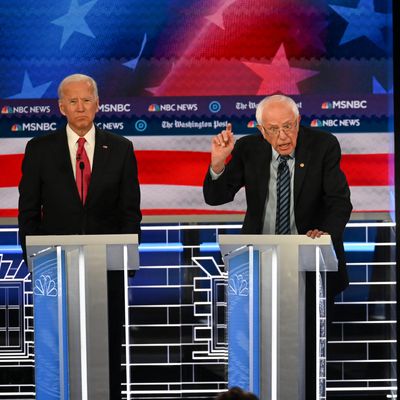
Most of the Democratic presidential candidates have spent the last several months attempting to wriggle free of a trap they set for themselves two and a half years ago, when the leading contenders jumped aboard Bernie Sanders’s Medicare for All plan. Politico has a story detailing how this bizarre debacle came out.
Before 2017, the dominant view within the Democratic Party held that single-payer insurance is a theoretically superior policy design that is impossible to obtain, at least in the short run. The unfortunate reason for this is the path dependency created by the peculiar American system, which, beginning in World War II, built a system in which employers provided insurance to most working adults. Generations of Democratic presidents — Truman, Johnson, Clinton — tried and failed to steer the system off the course. But the high cost of the system paradoxically made it harder to dislodge, as it created more constituencies with an interest in maintaining the status quo (insurers, doctors, hospitals, drugmakers) and made people who had employer-sponsored insurance ever more skittish about losing their benefits.
President Obama’s solution was to leave the employer system in place and build around it to cover the people outside the system: Medicaid expansion would cover those with the lowest incomes, and a regulated and subsidized market would offer insurance to those in the middle class who were locked out of the employer system. Obama’s reforms worked — imperfectly, like any social reform in history, but unambiguously. Obamacare’s remaining holes — excessive premium costs for high-income customers, and the refusal by some red states to join Medicaid expansion — could be patched up at relatively little cost.
What would be extraordinarily difficult would be moving the 150 million Americans already covered by employer insurance onto a public plan. It would require, first, transferring the cost of their insurance off the books of their employers, which is largely invisible, and onto the federal budget, requiring major tax hikes, It would also require persuading them that they’d be better off with a public insurance plan than their current coverage. I believe they would, but closing that sale to an electorate that is averse to change and suspicious of politicians is an extraordinary hurdle. It seemed crazy to multiply the fiscal cost and political risk of the Democrats’ health-care position merely to change the coverage of Americans who already had insurance.
Yet somehow, in the summer of 2017, almost all the Democratic presidential candidates decided to do just that.
At the time, the left had gained the appearance of an ascent that far outstripped its actual power. The aftermath of the 2016 election had persuaded progressive activists that Bernie Sanders was the party’s future, and had lost either due to cheating (as hard-core supporters maintained) or Hillary Clinton’s name recognition and establishment support. The future belonged to Bernie, or at least his ideas. The debate was taking place largely within Twitter, which magnified the views of progressive activists and intellectuals and underrepresented those of both the party’s voters and elected officials.
Politico’s reporting fills in some of the details that explain the foolhardy rush to endorse the Sanders bill, which proposed to fold the entire health-care system into Medicare, without explaining any of the tradeoffs that had made such an undertaking impossible. Two unnamed policy aides say they knew at the time the bill was not a finished product. But Kamala Harris leaped aboard, moving so quickly she joked at the time of her announcement that her own staff would be learning of her stance in real time.
At this point, the fear of being outflanked and holding an apparently unpopular “no we can’t” position took hold. “Kamala’s decision started a stampede,” one campaign operative tells Politico. “Some of them were checking the box of doing what they felt they needed to in order to appease the progressives,” another campaign adviser admits.
It took two years for the candidates to grasp the liability they had taken on. Progressive activists circulated polls showing “Medicare for All” drew broad public support, but that support rested on the absence of details. Once voters were told the policy involved higher taxes or moving everybody off employer-sponsored insurance, the bottom fell out. The strategy of attacking anybody who pointed this out as an industry shill was only going to work for so long.
At this point, the main distinction between the rivals to Sanders is the speed and distance with which they’ve raced away from his bill. Cory Booker and Pete Buttigieg almost immediately declared their support to be aspirational and symbolic. Harris oscillated disastrously between renewing her support and disavowing the bill (which is itself rather galling, given the the role she played in stampeding her colleagues toward it in the first place). Elizabeth Warren grasped tightly to the bill over the summer, then rolled out an elaborate series of pay-fors, and only now is endorsing an interim plan that she promises to undertake first, before getting to Medicare for All by the end of her term. (In reality, she is signaling that later means never, but the question is whether that will allow her to disavow the attacks on the bill if she wins the nomination.) Ed Kilgore’s case that Bernie himself will need to bail the Democrats out of the jam created by their support for his bill is an indication of just how dire the situation has grown.
Progressive activists are not the only source of bad political ideas. Moderates have bad ideas, too. Yet what is so striking about the Medicare for All debacle is how foreseeable it was, and how so many candidates plunged ahead simply because all the other candidates were doing it, too.






























